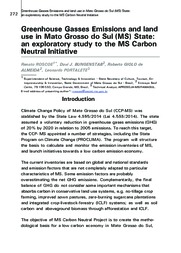Greenhouse Gasses emissions and land use in Mato Grosso do Sul (MS) State: an exploratory study to the MS carbon neutral initiative.
Greenhouse Gasses emissions and land use in Mato Grosso do Sul (MS) State: an exploratory study to the MS carbon neutral initiative.
Autoria: ROSCOE, R.; BUNGENSTAB, D. J.; ALMEIDA, R. G. de; PORTALETE, L
Resumo: Climate Change Policy of Mato Grosso do Sul (CCP-MS) was stablished by the State Law 4.555/2014 (Lei 4.555/2014). The state assumed a voluntary reduction in greenhouse gases emissions (GHG) of 20% by 2020 in relation to 2005 emissions. To reach this target, the CCP- MS appointed a number of strategies, including the State Program on Climate Change (PROCLIMA). The program will structure the basis to calculate and monitor the emission inventories of MS, and launch initiatives towards a low carbon emission economy. The current inventories are based on global and national standards and emission factors that are not completely adapted to particular characteristics of MS. Some emission factors are probably overestimating the net GHG emissions. Complementarily, the final balance of GHG do not consider some important mechanisms that absorbs carbon in conservative land use systems, e.g. no-tillage crop farming, improved sown pastures, zero-burning sugarcane plantations and integrated crop-livestock-forestry (ICLF) systems; as well as soil carbon and aboveground biomass through afforestation and ICLF. The objective of MS Carbon Neutral Project is to create the methodological basis for a low carbon economy in Mato Grosso do Sul,
Ano de publicação: 2016
Tipo de publicação: Artigo em anais e proceedings
Unidade: Embrapa Gado de Corte
Palavras-chave: Carbono, Climate change, Greenhouse gases
Observações
1 - Por padrão são exibidas publicações dos últimos 20 anos. Para encontrar publicações mais antigas, configure o filtro ano de publicação, colocando o ano a partir do qual você deseja encontrar publicações. O filtro está na coluna da esquerda na busca acima.
2 - Para ler algumas publicações da Embrapa (apenas as que estão em formato ePub), é necessário ter, no celular ou computador, um desses softwares gratuitos. Sistemas Android: Google Play Livros; IOS: iBooks; Windows e Linux: software Calibre.
Acesse outras publicações
Acesse a Base de Dados da Pesquisa Agropecuária (BDPA) para consultar o acervo completo das bibliotecas da Embrapa.

